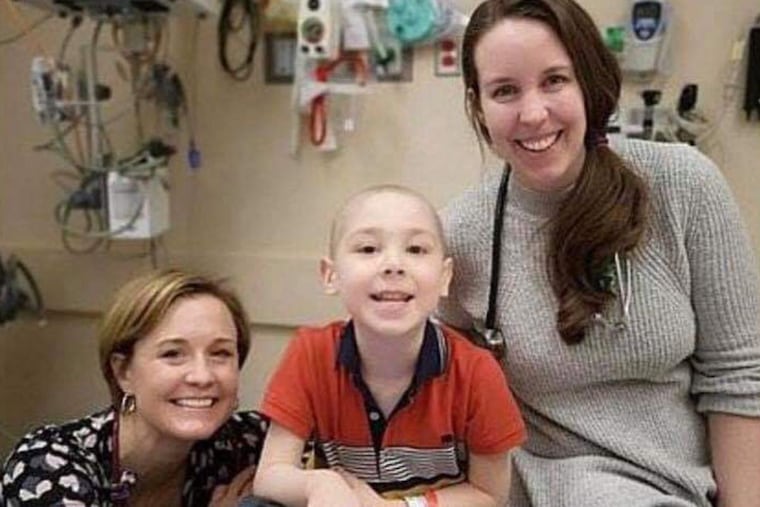British boy who crowdfunded money for T-cell therapy at CHOP is now free of cancer
In a Facebook video, British 4-year-old Zac Oliver told his multitude of fans that his is now cancer free. His family raised $840,000 for T-cell treatment at CHOP.

Zac Oliver, the British tyke whose worldwide following helped his family raise $840,000 for immunotherapy at Children’s Hospital of Philadelphia, now has no sign of his rare form of leukemia.
“Guess what, everyone? I have no cancer,” Zac, 4, said in a video posted to YouTube on Friday, the day after he arrived back in his hometown of Broseley.
His mother, Hannah Oliver-Willets, thanked supporters — from schoolkids to celebrities such as music mogul Simon Cowell and professional footballer Jermain Defoe.
“Throughout this very difficult journey, we have been lucky enough to have witnessed the most astonishing and selfless acts by friends, family, and strangers to help Zaccy,” she posted on Facebook.
His father, Mark Garbett, said in a message to The Inquirer, “It’s all been a whirlwind. Zac is cancer-free and doing amazingly well. We cannot thank the doctors enough for what they have done for us.”
Zac was treated with Kymriah, the Novartis therapy that is genetically engineered from the patient’s own disease-fighting T cells. In clinical trials of the breakthrough drug, about 80 percent of pediatric leukemia patients — children who had exhausted conventional therapies — went into remission within a month of treatment. However, about half relapsed and died within a year.
Zac was diagnosed in May with an ultra-rare genetic subtype of acute lymphoblastic leukemia called near haploid. Chemotherapy did not eradicate the disease, in which immature white blood cells grow out of control. Doctors told his parents that the standard last-resort therapy — a stem-cell transplant — would offer little hope because his disease was so aggressive.
Confronted with the grim prognosis, Oliver-Willets, an occupational therapist, and Garbett, a heating contractor, began searching for another option. The couple separated before Zac’s birth, but both parents are closely involved in his life.
The parents discovered that England’s national health-care system was on the verge of making Kymriah available to children, but only after they had relapsed and exhausted standard leukemia treatments. Waiting for Zac to relapse, his parents believed, would be a death sentence.
CHOP doctors, who have discretion to use Kymriah earlier in the disease course, agreed to cover Zac’s therapy and related care — which can vastly inflate the drug’s $475,000 price tag — for $604,000.
In September, the family launched a crowdfunding campaign to reach that daunting goal. Their wrenching story spread in traditional media and on social media from Britain to Thailand, Russia, and beyond. Grassroots fundraisers, donations from celebrities, and an anonymous gift of $130,000 enabled Zac and his parents to travel to CHOP twice: in November, when Zac’s T cells were siphoned from his blood, and in January, when he returned for the cells, which had been engineered to recognize and attack his cancer.
When T cells are reinfused, patients typically suffer serious or even life-threatening complications as their immune system goes into overdrive. But Zac’s reaction was relatively mild.
“Zac just got sick for about three days and stayed two days in the hospital,” he father said. “He just got a high fever, so he was one of the lucky ones.”
Last Tuesday, CHOP gave the family the good news: tests showed no evidence of cancer.
“He’s up and about, running around — he’s the Zac we used to know, so full of energy again,” Garbett told BBC News. “He’s cancer-free, and we are praying it will stay that way.”